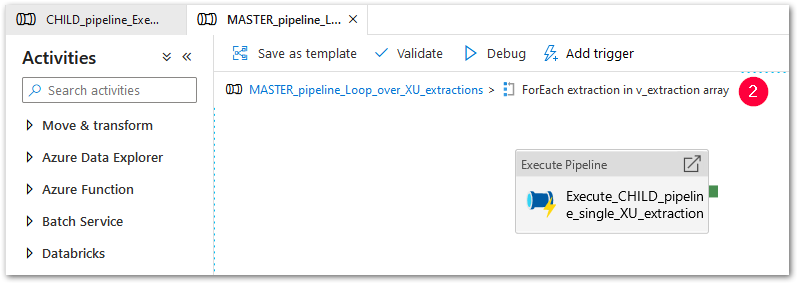The following article describes a scenario that uses Azure Data Factory (ADF) to trigger and automate SAP data movements using Xtract Universal’s webservices.
This article targets customers that utilize ADF as a platform for orchestrating data movement and transformation.
Note: The depicted scenario is no best practice or recommendation. The following is a suggestion of how an orchestration of Xtract Universal extractions from ADF can look like, see also Integration in Azure Data Factory using Commandline.
Prerequisites #
- A self-hosted Integration runtime is set up on the server Xtract Universal runs on. This ensures that Xtract Universal’s web server is accessible from ADF over http(s).
- The extraction uses a push-destination, e.g., Azure Blob Storage or Azure SQL Server.
- The extraction runs successfully when called from a web browser, see Execute and Automate - Call via Webservice.
- Access to Azure Data Factory.
- Knowledge on how to build ADF pipelines.
Basic Principles #
The depicted scenario builds upon the following basic principles:
- Xtract Universal offers a Web-API through which various actions can be performed via http(s) calls. The depicted scenario uses the web API to:
- Microsoft’s self-hosted Integration runtime enables access to on-prem resources, such as Xtract Universal, from ADF.
- Microsoft’s ADF offers a Web Activity that allows calling resources via http(s) and a self-hosted Integration runtime.
The depicted scenario uses two ADF pipelines to run extractions from ADF:
- a Child Pipeline that extracts data from SAP.
- a Master pipeline that executes the child pipeline for different extractions.
Child Pipeline #
Follow the steps below to create a child pipeline that extracts data from SAP:
- Run an extraction using a web activity (1), see Web-API - Run Extractions.

- Query the extraction status in regular intervals using a web activity (2), see Web-API - Get Status of an Extraction.

- Add a condition that checks the extraction status (3) and executes follow up activities in case the extractions fails.
Example: When the extraction fails, use a web activity to query the extraction log, see Web-API - Get Extraction Logs, and write the logs to an Azure Blob Storage account. A follow up event can then be triggered by the Storage event, e.g., sending a notification email.

The pipeline functions as a standalone solution. It can be run in debug mode or can be triggered via a scheduler.
Master Pipeline #
Follow the steps below to create a master pipeline that executes the child pipeline multiple times, each time for a different extraction. This allows automatic iteration through all extractions defined in Xtract Universal.
- Query a list of extractions (1) using a web activity, see Web-API - Get Extraction Details.

- Loop over the list of extractions (2).
- In the loop, pass the name of the current extraction to the Child pipeline and execute the Child pipeline for that extraction.

Variables and Parameters #
Parameters and variables are used in both pipelines:
- Parameters provide constant values that are used in multiple activities.
- Variables provide dynamic values at runtime and are used to pass on data between different activities or pipelines.
The following parameters and variables are used in the depicted scenario:
| Parameter / Variable | Name | Data Type | Defined in | Description |
|---|---|---|---|---|
| Parameter | p_global_XU_HOST | String | global | This parameter contains the base URL of the Xtract Universal webserver, here: https://MyOnPremXuServer.theobald.local:8165. The parameter is used in every Web Activity. |
| Variable | v_XU_extractions_array | Array | Master pipeline | This variable stores the list of XU extractions returned by Web activity Get_List_of_XU_extractions. The variable’s value is set in the Set variable activity Set variable_extraction array. |
| Parameter | p_extractionName_from_Master | String | Child pipeline | This parameter takes on the value (extraction name) of the current iteration For Each activity *ForEach extraction in v_extraction array. As a default name, you assign a name of an extraction. This allows running the Child pipeline w/o being triggered from the Master pipeline. |
| Variable | v_TIMESTAMP | String | Child pipeline | This variable stores the extraction’s timestamp returned by Web activity XU_START_JOB. The variable’s value is set in the Set variable activity TIMESTAMP. The variable is later used in Web activities CHECK_XU_JOB_STATUS and XU_Get_Extraction_Log. |
| Variable | v_JOB_STATUS | String | Child pipeline | This variable stores the extraction’s run status returned by Web activityCHECK_XU_JOB_STATUS. The variable’s value is set in the Set variable activity JOB_STATUS. As long as the variable has the status “Running”, the Until activity IS_JOB_RUNNING is executed. Other values this variable can can have are “FinishedNoErrors” and “FinishedErrors”. |
| Variable | v_Log | String | Child pipeline | This variable stores the extraction’s log returned by Web activityXU_Get_Extraction_Log. The variable’s value is set in the Set variable activity Set_variable_XU_Log. The value of this variable is appended to the log file in the Copy data activity Copy Extraction Log to Blob. |
For more information on variables in ADF, see Calling Dynamic Extractions with Variables in ADF.